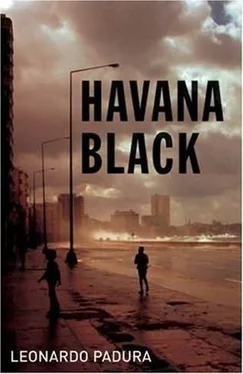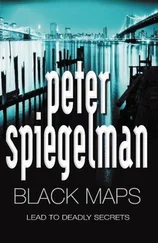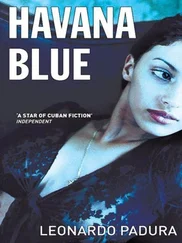The origins of such a perverse murder contained all the ingredients of revenge, but the most important item remained unknown: what recipe had created that stew and who had done the cooking?
“What if it was just a matter of jealousy and cuckoldry?” asked the Count, and Major Rangel looked him in the eye from behind his Lancero’s infernal glow, before declaring: “Then best not tangle with the wife of the guy who cuts the balls off everyone else, right?”
Whenever he travelled by bus, Mario Conde tried his best to get a window-seat. In his university student days, he would get up twenty minutes earlier than necessary to queue for an empty bus. Unhurriedly, he would randomly choose one of the two sides of the vehicle and keep close to the metal to defend the privilege of the window-seat. Far from the aisle, he enjoyed the material advantages of not having his shoulder knocked by unattractive appendages, his foot trodden on or banged by crates. But there were two much more valuable rewards, which he would alternate according to need, state of mind and interests: he either read for the thirty-five minutes the journey took from his neighbourhood to the stop nearest to the faculty (he only did that on exam days or when he had a really good book), or devoted himself (as he preferred) to studying the buildings the bus encountered on its route, enjoying the second or third floors on the old roads of Jesús del Monte and la Infanta, hidden to anyone not prepared to raise their eyes toward their elusive heights. The Count had acquired that habit from his friend Andrés – who learned it in turn from beautiful Christine, that sexual being with whom they had all fallen in love – and it became such an organic need that when he looked at the buildings he would feel body and mind separating out their most connected atoms, releasing part of his self from his seat to float several yards above the street’s dark, greasy surfaces, to penetrate forgotten mysteries, remote histories, dreams wandering behind the walls of places with which he communed, as if they were other souls in distress, also liberated from perishable, onerous matter. That was how he’d discovered the most beautiful, audacious balconies, sculpted on city façades with the most extravagant motifs, eaves decorated with wedding-cake piping, anti-neighbour wrought-iron grilles forged by blacksmiths militant in every baroque art, and he had also discovered that death hovered, nearer every minute to all those centennial wonders of iron, cement, plaster and wood, which turned their best faces to the road, filthy from neglect of historic proportions, from petrified dust and apathy immemorial, whose inhabitants crammed into houses that had lost their dignity and character, degraded by the need for living quarters bereft of water, with communal bathrooms and congenital promiscuity. And although he knew that the pleasure at car level wasn’t the same as from the dais of a bus window-seat, which favoured more spiritual outpourings, on that afternoon the Count made of Sergeant Palacios two special requests for which he would be eternally grateful to him: first, for him to keep quiet; second, for him to drive at twenty miles an hour. He wanted only silence and humane speeds in order to observe yet again those elusive landscapes he knew and loved, as he felt afraid it might be his last encounter with the most abandoned, ill-treated architecture of his city of birth: the raging hurricane that at midday was heading towards the South of Hispaniola, after it had devastated tiny Guadalupe – even uprooting some of the trees Victor Hugues himself had ordered to be planted there two centuries ago in a Place de la Victoire dedicated to revolutionary ideals – that same bastard of a cyclone might enter these streets in a few days and demolish the decrepit beauty of second and third floors, which he alone – he was convinced – contemplated, reflecting on their inevitable, regrettable demise, prepared by years of neglect. What other destiny could that city expect if not violent death forged by the protracted agony of oblivion? Or would it also die castrated, a new Atlantis submerged beneath the sea by an unforgivable yet still unknown sin? Fuck it, he told himself from the gloomy depths of such reflections: it doesn’t matter how it dies: we all die in the end. Even you will die. And to usher that transition a little nearer he lit another cigar and puffed with relish as if it were the last wish granted a man on death row.
When he got back to Headquarters and told Colonel Molina: I’ll take the case on, his new boss patted him gleefully on the back and agreed to another request: Sergeant Palacios could work with him. But now the Colonel began to name his conditions: he had a maximum of three days to solve the mystery of the castrated death of Miguel Forcade; he must act with the utmost discretion, because he already appreciated the new political implications of what would be a juicy item for the international press, always keen to discredit the government; he should report to him personally twice a day – though he could talk to Major Rangel to his heart’s content – because every evening he had to phone Somebody who in turn had to phone Someone charged by the Ministry for Foreign Affairs with speaking to the American consul to report on how investigations were progressing; and he should try to be as orthodox as possible in his methods, though he had carte blanche to do whatever was necessary: everything on the condition that within the three prescribed days he should get to the truth, whatever that truth might be: the affair could become another international scandal, which the yellow press would feast on, the Colonel emphasized, apparently obsessed by the taste and colour of the mass media, and the only way to cut it dead was by coming up with the truth. And he repeated his organic military salute.
Standing in front of the Vedado mansion from which the currently American, now deceased Miguel Forcade had set out to an unforeseen fate and whither he had returned eleven years later, Mario Conde wondered what might be the price for finding the truth required by his boss… First of all, why did they kill Miguel Forcade like an animal?
“What’s our way in going to be, Conde?” Sergeant Manuel Palacios asked eventually, after slotting away the aerial and locking the car under the irritated gaze of his superior.
“The dead man’s parents live here and his wife must be here as well, as she came on the trip to visit… For the moment let’s just try to find out a bit about Miguel Forcade the man.”
“Who was a bastard?”
“We can take that as read, but we need to know the brand and type,” the Count emphasized as he opened the gate leading to the ’20s mansion, equally a victim of neglect and apathy, crying out for a new lick of paint.
The surrounding garden was a damp, bushy arbour, with a peculiar mixture of shrubs, flowers, creepers, exuberant trees and grasses, although all that floral disorder seemed exquisitely cared for, as witnessed by the tracery of clearly marked paths through the undergrowth that spread across the whole plot. The work of a hand both rigorous and tolerant in relation to the desires of plants was evident in that small tropical forest, where the Count registered the majestic crest of a silk-cotton tree, the dark, gnarled fruits of a mamey and the prehistoric miracle of two anonales , still laden with their violently green pomegranates, owners of delicate, white hearts divided into a hundred black seeds. As he walked along the path to the house, the Count came across an overgrown picuala and, as he passed by, he dared pick up one of its tiny flowers, which existed in a strange melding of colours, between red and white.
“Josefina loves the scent of the picuala ,” he said, knocking on the door after he’d put the flower in his pocket.
Читать дальше











